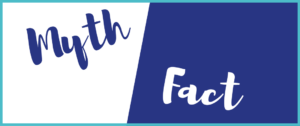Myths vs Facts
Did you know:
- 1 in 4 women in England and Wales will experience domestic abuse in their lifetime
- On average, it takes 7 attempts before a woman is able to leave a perpetrator for good
- The police receive a domestic abuse-related call every 30 seconds
- 20% of children (1 in 5) in the UK have lived with ad adult perpetrating domestic abuse
Domestic abuse is unfortunately all too common in the UK, and with statistics like those above, it is imperative that women get the support they need to in order to recover from their domestic abuse experiences.
There are many myths surrounding domestic abuse and unfortunately too many individuals believe them. However, where there is a myth, there is a fact – here are some common myths vs facts. Keep checking back as we add more.

Myth:
If children don’t witness the violence, they won’t be affected.
Fact:
Research shows that 90% of children are in the same or a nearby room when violence occurs, so even if they don’t see it, they usually hear it. This can affect them in the short and long-term both emotionally and psychologically.
Myth:
Domestic abuse always involves physical violence
Fact:
Domestic abuse is defined as an incident or pattern of incidents of controlling, coercive, threatening, degrading and violent behaviour, including sexual violence, by a partner or ex-partner. This can include coercive control, emotional or psychological, physical, sexual, financial, environmental, harassment, stalking, and online or digital abuse.
Myth:
If it was that bad, she’d leave.
Fact:
It can be difficult for a woman to leave an abusive partner. Like any other relationship, one that ends in abuse began with falling in love and being in love. Abusers often isolate their partners from family and friends in order to control them, making it even more difficult for an abused woman to exit the relationship.
Getting support
At NIDAS, we provide a variety of services aimed at women and families who have been affected by domestic abuse. For more information about how we can support you or someone you know experiencing domestic abuse, please learn more about our services here.
To get in touch with us to discuss how we can support you, please call us on 01623 683 250. Contact us via email at [email protected] or [email protected] to make a referral for our services.